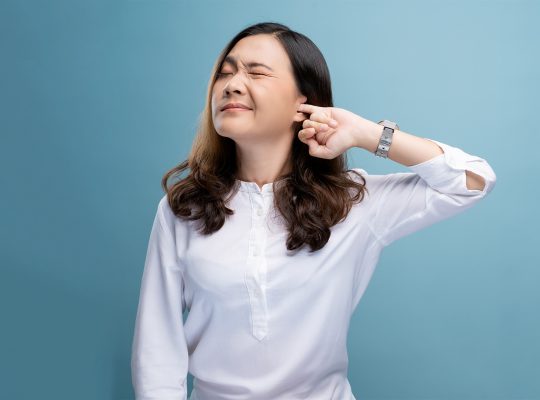Ménière’s disease is a chronic disorder of the inner ear. People who have this disease often experience intense attacks of dizziness (vertigo), hearing loss, a full feeling in the ear, and tinnitus (ringing in the ears). The disease can affect people of all ages, but is most common in adults between the ages of 40 and 60.
The cause of the disease is not yet fully understood, but it is thought to be related to a buildup of fluid in the inner ear. This can put pressure on the delicate structures in the ear and lead to the symptoms of the disease.
Symptoms of Ménière’s disease
The symptoms of Ménière’s disease often come in attacks. These attacks can start suddenly and last from a few minutes to hours. Symptoms can vary from person to person, but the most common are:
1. Dizziness (vertigo).
People with Ménière’s disease often experience severe dizziness. This is often described as a feeling that the world revolves around you. This dizziness can be so intense that it becomes difficult to stay upright or even to walk. Sometimes this is accompanied by nausea and vomiting.
2. Hearing loss
Hearing loss is another common symptom. This hearing loss may be temporary at first, but over time it may become permanent. The hearing loss usually affects one ear, but in some cases both ears may be affected.
3. Tinnitus
Many people with Ménière’s disease suffer from tinnitus, also known as tinnitus. This is a constant or pulsating sound in the ear, such as a beep, buzz or noise. Tinnitus can be very disruptive and interfere with daily life.
4. Pressure or full feeling in the ear
Another common symptom is a feeling of pressure or fullness in the ear. This may feel as if there is water in your ear, or as if something is pressing on the ear.
What causes Ménière’s disease?
The exact cause of Ménière’s disease is not yet known, but there are several theories. One of the most accepted theories is that the disease is related to a problem in fluid regulation in the inner ear. The inner ear contains a special fluid that helps regulate balance and hearing. If this fluid is not drained properly or if too much of it is produced, it can cause pressure on the structures in the ear, leading to the symptoms of the disease.
Other factors that may play a role include:
- Genetic predisposition: People with a family history of Ménière’s disease may have an increased risk of developing the disease.
- Autoimmune diseases: Some researchers believe that autoimmune diseases, in which the immune system attacks its own body, may play a role in the development of the disease.
- Allergies: Allergies can contribute to the symptoms of Ménière’s disease, especially if they lead to inflammation in the ear.
Diagnosis of Ménière’s disease
Diagnosing Ménière’s disease can be difficult because the symptoms are similar to those of other conditions. There is no specific test for the disease, so doctors usually base the diagnosis on the patient’s symptoms and the exclusion of other possible causes.
A doctor can perform several tests to rule out other causes and confirm the diagnosis:
- Hearing tests: These tests can measure hearing loss and help determine what type of hearing loss is present.
- Balance tests: These tests can help determine if there are problems with the balance organ in the ear.
- MRI or CT scan: These imaging techniques can help rule out other causes of symptoms, such as a tumor.
Treatment of Ménière’s disease
There is no cure for Ménière’s disease, but there are treatments that can help manage symptoms and reduce the frequency and severity of attacks. Treatments can vary depending on the severity of the disease and the specific symptoms a person experiences.
1. Medicine
Medications can help reduce dizziness and nausea during an attack. Examples of such drugs are:
- Antihistamines: These medications can help reduce dizziness.
- Diuretics: These are urinary pills that can help reduce excess fluid in the body and inner ear.
- Anti-emetics: These are medications that prevent nausea and vomiting.
2. Diet and lifestyle
Diet and lifestyle modifications can also help manage symptoms:
- Low-salt diet: Limiting the intake of salt can help reduce the accumulation of fluid in the inner ear.
- Avoid caffeine, alcohol and nicotine: These substances can worsen symptoms.
- Stress management: Stress can worsen the symptoms of Ménière’s disease, so it is important to find ways to reduce stress, such as through meditation or yoga.
3. Physical Therapy
Physical therapy, and vestibular rehabilitation in particular, can help improve balance and reduce dizziness. A physical therapist may recommend specific exercises designed to train the balance organs.
4. Surgical procedures
In severe cases, where other treatments do not help, surgery may be considered. Examples of surgical options include:
- Endolymphatic sac decompression: This surgery reduces pressure in the inner ear by removing some of the bone around the endolymphatic sac.
- Labyrinthectomy: In this surgery, the inner ear is removed, leading to complete hearing loss on the affected side, but the dizziness may disappear.
- Vestibular neurectomy: This surgery involves cutting the balance nerve, which can relieve dizziness while preserving hearing.
Living with Ménière’s disease
Living with Ménière’s disease can be difficult, especially since the attacks are unpredictable and can disrupt daily life. People with the disease often must learn to cope with the fear of another attack and the impact the disease has on their hearing and balance.
1. Support and education
It is important for people with Ménière’s disease to be well informed about their condition and to seek support from others. Support groups and online forums can provide valuable information and emotional support.
2. Self-care
Self-care is crucial to managing symptoms. This may mean learning how to recognize a seizure and what you can do to calm yourself and manage symptoms when a seizure occurs.
3. Communication with caregivers
Maintaining good communication with physicians and other health care providers is important. This helps adapt treatment to changing symptoms and get the best care.
4. Adjustments in daily life
People with Ménière’s disease can adjust their lives to better cope with the condition. This may include avoiding activities that can trigger dizziness, such as standing up quickly or driving long distances.
Conclusion
Ménière’s disease is a complex and challenging condition that can have a major impact on the lives of those who suffer from it. Although there is no cure, there are several treatments and strategies that can help manage symptoms and improve quality of life. It is important to seek support, stay informed and work with health care providers to get the best care.








